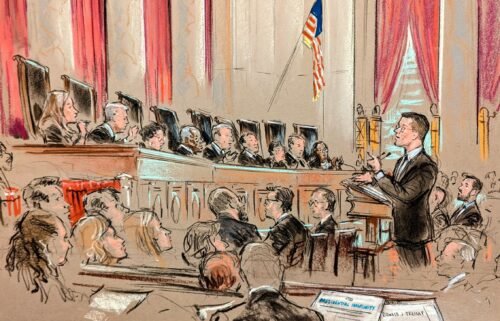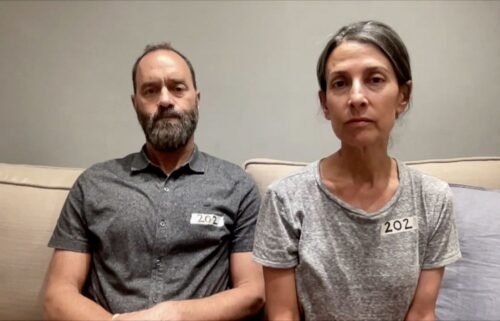Breonna Taylor investigations are far from over as demands for transparency mount
Kentucky’s top law enforcement officer says he presented all the evidence in the Breonna Taylor case to a grand jury, but many investigative avenues remain open.
A federal probe and a Louisville police review hold the potential to yield more details in the case, but it’s unclear if either will result in additional charges.
Chief among critics’ and the Taylor family’s questions: How were none of the Louisville officers involved in the March raid on the 26-year-old’s home charged with her actual killing?
Ex-Detective Brett Hankison faces three counts of wanton endangerment for blindly firing shots that penetrated the walls of a neighbor’s apartment, but “there is no conclusive evidence” any of those bullets hit Taylor, state Attorney General Daniel Cameron said Wednesday in an announcement that set off demonstrations from New York to Los Angeles.
Officer Myles Cosgrove and Sgt. Jon Mattingly, he added, were justified in their use of force because Taylor’s boyfriend opened fire first when they breached her door. The officers remain on administrative leave, Louisville interim Police Chief Robert Schroeder said.
After Cameron’s announcement, Kentucky Gov. Andy Beshear and Louisville Mayor Greg Fischer called for the release of any public information that would not jeopardize ongoing investigations.
“We ought to be able to see the evidence and see the facts that led to that conclusion,” Beshear said. “I trust the people of Kentucky with the truth. I trust them to be able to look at the facts, but they’re not able to do that right now.”
Fischer added during a Thursday news conference, “What we are doing is working with the attorney general and both the FBI to understand what we can release so it doesn’t interfere with any of the ongoing investigations. What we want to do is get as much of this information out as soon as we can.”
Here is where some of that evidence might arise:
Release of grand jury proceedings
Grand jury proceedings are secret out of necessity, prosecutors and legal experts say. Secrecy helps guarantee witnesses’ and jurors’ candor. If grand jury records are released, witnesses might not be frank, and the FBI and myriad prosecutors have worked in the past to keep such hearings under wraps, even in decades-old cold cases in which the suspects are presumed dead.
There have been exceptions, though, such as the fatal police shooting of Michael Brown in Ferguson, Missouri, in 2014. After Officer Darren Wilson said he shot Brown in self-defense, the grand jury opted not to indict him. Months later, the records from the proceedings were released — a move applauded by attorney Ben Crump, who represents both Brown’s and Taylor’s families.
The Ferguson move “showed transparency because right now it appears to many people that this is a sham proceeding (in Louisville) — that there was an attempt to exonerate these officers moreso than hold them accountable,” Crump said Thursday of Cameron’s decision.
The attorney general “did not get into the nuances” of the state probe with the family, Crump said, leaving many questions — among them, why the Louisville officers were “executing this dangerous, unconstitutional — we feel — unjustifiable, no-knock warrant that was based on a lie.”
“What did they present to that grand jury? That is the question everybody’s asking,” Crump told CNN.
The FBI investigation
On May 21, the FBI’s Louisville office said it was investigating the circumstances surrounding Taylor’s killing. Agents took documents from Louisville police and interviewed her neighbors, sources told CNN.
Robert Brown, FBI Louisville’s special agent in charge, declined to offer extensive details but vowed to conduct “a fair, thorough and impartial” review.
“When investigating potential civil rights violations, the FBI will take a fresh look at all the evidence, including interviewing witnesses who have already spoken to the original investigating agency, interviewing witnesses who have not yet spoken to law enforcement, and examining all physical and video evidence to better understand what transpired,” the bureau said.
Though the FBI wouldn’t outline specifics, the warrant is doubtless under review, as the Fourth Amendment of the Constitution prohibits unreasonable search and seizure.
Critics of the Louisville police point out that no-knock warrants are reserved for dangerous suspects or those who might destroy evidence. While Jefferson County Circuit Court Judge Mary Shaw authorized police to enter Taylor’s home without knocking, affidavits show, police commanders later decided Taylor’s house was a “soft target” and they’d knock and announce their presence, according to a source familiar with the details of the operation. The source spoke to CNN in July on the condition of anonymity because of the ongoing investigation.
Mattingly, according to the source, told investigators he banged on the door several times and announced, “Police. Come to the door,” before a lieutenant ordered officers to break down the door.
This is a major point of contention: While Cameron said one neighbor corroborated the police account, a lawyer for Kenneth Walker III, Taylor’s boyfriend, says the neighbor did not speak English well and changed his story, while several other neighbors said they didn’t hear police identify themselves.
Several of Taylor’s neighbors told CNN, directly or through their attorney, the gunfire woke them and they did not hear what preceded it.
In June, Schroeder, the acting Louisville police chief, placed Detective Joshua Jaynes, who requested the search warrant, on administrative leave.
“Questions have been raised by the Taylor family, their attorneys, the postal inspector, and others about how and why the search warrant was approved,” Schroeder told reporters in announcing the decision.
The FBI’s probe is ongoing, and “this work will continue beyond the state charges announced today,” the agency said in a statement after Cameron’s announcement.
Internal police investigation
The Louisville Metropolitan Police Department is looking into its own, which could yield additional details, but police departments aren’t always forthcoming with the specifics of such probes.
The department’s professional standards unit is investigating the actions of Cosgrove, Mattingly and Jaynes, as well as detectives Tony James, Michael Campbell and Michael Nobles, to learn whether they violated any policies, LMPD spokesman Sgt. Lamont Washington told CNN.
Campbell has declined to comment. Attorneys for Cosgrove, Jaynes and Nobles did not respond to CNN’s requests for comment, and James’ attorney could not be immediately identified.
Mattingly defended himself in a letter this week to his colleagues that referred to Taylor protesters as “thugs” and blasted the FBI and his department’s handling of the case.
“Sgt. Mattingly was following orders of superior officers, was not involved in the planning process of the arrest, and at all times followed established police procedures,” attorney Todd McMurtry has previously told CNN.
Hankison was fired in June, with Schroeder citing the officer’s decision to “wantonly and blindly” fire 10 rounds into Taylor’s home. Hankison’s actions “displayed an extreme indifference to the value of human life,” the acting chief said.
Hankison is appealing his termination. The evidence doesn’t support the charges against Hankison, who will plead not guilty at arraignment, defense attorney Stew Matthews said Thursday.
Taylor family attorney Lonita Baker has applauded the internal investigation and urged the professional standards unit to finish its review expeditiously.
“It is our belief that several policies were violated by the involved officers, and they should be subject to disciplinary action up to and including termination,” she said.
Kenneth Walker lawsuit
Taylor’s boyfriend was initially charged with attempted murder of a police officer and first-degree assault — charges that were dropped — but Walker could be charged again, pending “additional investigation” by the state and FBI, Kentucky Commonwealth Attorney Tom Wine said.
The decision to drop the charges provides fodder for critics who ask: If the warrant was justified and the police followed procedure and properly announced themselves, why drop the charges against a man who admittedly fired first and shot Mattingly in the leg?
Walker “lives in constant fear” since he was wrongfully arrested, he said in a $10.5 million lawsuit alleging malicious prosecution, false arrest and assault. He was defending himself with a licensed firearm when plainclothes police “violently broke down the door,” he alleges. The lawsuit cites the “stand your ground” law.
“Kenny was clearly acting in self-defense, that he had every right to do, and they knew that, yet they charged him anyway because if he’s convicted it justifies their actions,” attorney Steve Romines has said.
Wine’s spokesman, Jeffrey Cooke, claimed Walker was suing merely to “foreclose the possibility of being charged again.” Cameron, through a spokeswoman, said he was incorrectly named in Walker’s suit and has no involvement in the case. Sgt. Washington, the LMPD spokesman, declined to comment on pending litigation.
Key to Walker’s lawsuit is his assertion that he heard pounding at the door, but he didn’t hear anyone identify himself as police, the attorney said.
“It’s not in dispute that Kenny fired the first shot after they break in the apartment at about 1 in the morning without announcing that they’re police, and Mr. Cameron said, ‘Well, the police said they announced.’ They’re the targets of the investigation. We’re going to take their word for it?” Romines asked CNN on Thursday.
Regarding Cameron saying a neighbor corroborates the police account, Romines said, “There were 12 independent witnesses who said they did not announce that they were police. … The witness that they say corroborated it, (in) his initial interview with the police he said they did not announce, and police had to interview him multiple times after that to eventually get him to say, ‘Yeah, they may have announced,’ and he’s got a language barrier.”
A jury should decide if the police actions were justified, he said, but Cameron chose to make the decision “by prosecutorial fiat” when Kentucky law has no provision allowing police to claim self-defense in shooting Taylor.
“You don’t get to just recklessly shoot bystanders. It’s like pulling out a machine gun and wiping out a group of people, saying, ‘That guy pulled a gun on me.’ You do not get to do that under Kentucky law,” Romines said.
While Louisville has already settled with Taylor’s mother, Tamika Palmer, for $12 million (with no admission of wrongdoing), her attorney, Baker, said this wasn’t the end. She and co-counsel Sam Aguiar intend to join forces with Romines in Walker’s lawsuit in hopes of unearthing more critical details.
On Thursday, Baker, too, questioned Cameron’s decision, asking how he charged Hankison with wanton endangerment, alleging he imperiled Taylor’s neighbors but didn’t acknowledge that the same gunshots endangered Taylor and others.
“America will find out what happened to Breonna Taylor,” Baker said earlier this month of Walker’s lawsuit. “There are only certain remedies in civil litigation, so we have to evaluate whatever happens, but we want to the truth come out.”



